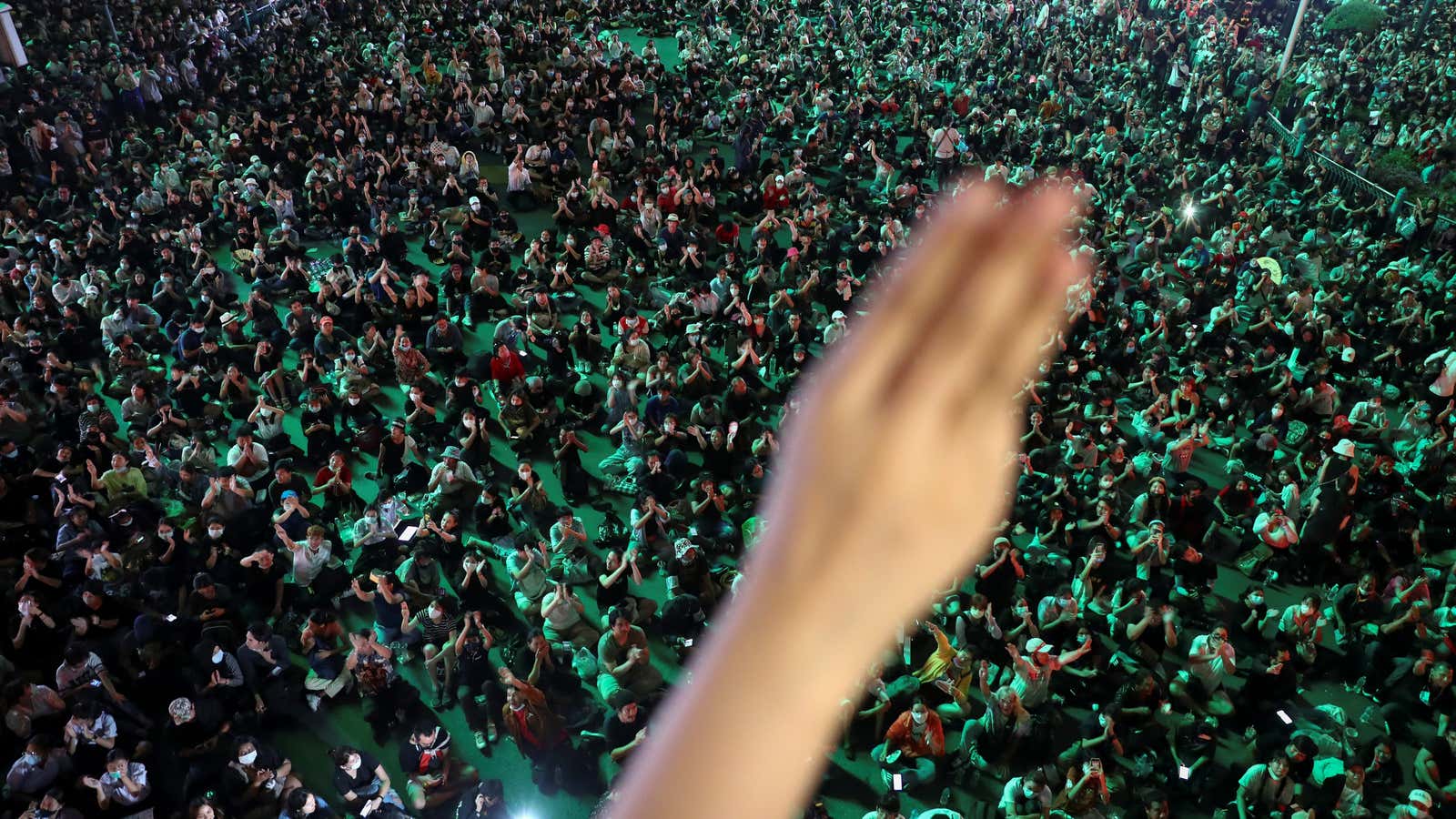The images share striking similarities. Thousands raising their hands in the air to demand political change. Young demonstrators wearing goggles and hardhats. Umbrellas being passed through the crowds to the front line. Crowds parting like the Red Sea to let an ambulance through.
Over the weekend, as tens of thousands in Thailand defied a ban on gathering and turned out to protest in Bangkok and across the country, Hong Kongers responded with messages of support. On a roadway median that used to showcase Hong Kong protest graffiti, a newly spray-painted slogan appeared calling on people to #StandWithThailand. Elsewhere, activists set up a street stand and gave speeches urging Hong Kongers to support Thailand. And today, activists including Joshua Wong staged a protest outside the Thai consulate, holding up the three-fingered salute of the Thai protests in a show of solidarity and rewording a popular Hong Kong protest slogan: “Fight for freedom, stand with Thailand! Free Thailand, democracy now!”
“These pictures and scenes are quite similar to what happened in Hong Kong in past years, and we have empathy with people…who are still fighting for freedom,” said Ted Hui, a pro-democracy lawmaker, referring to photos of Thai police in riot gear suppressing protests with batons and water cannons.
Protests in Thailand began over the summer, initially calling for the resignation of prime minister Prayut Chan-ocha, the former junta leader who oversaw the drafting of Thailand’s current constitution, and continued in power after elections last year. The demands have broadened to include calls for a new constitution and reforms to the monarchy, including harsh lèse majesté laws that make even mild criticism of the monarchy a crime. They face an uphill battle against laws that critics say severely undermine freedom of speech, the press, and assembly.
The solidarity between Hong Kong and Thai protesters has been months in the making as well. Dubbed the Milk Tea Alliance, it began earlier this year, sparked by a Thai actor’s errant “like” of a tweet that referred to Hong Kong as a country, which naturally ruffled nationalistic Chinese sensitivities. A torrent of virtual mudslinging ensued, as Thai netizens, with the help of Taiwanese and Hong Kong counterparts, duked it out with Chinese internet trolls. Using a mixture of wry humor, quick-witted memes, and the hashtag #MilkTeaAlliance, they’ve since been steadily building a grassroots social media campaign to push back against Chinese internet users and bots who often flood platforms with pro-Beijing posts.
The bond between Thai and Hong Kong protesters goes back further too, to 2016. Wong was invited that year to speak with Thai students, only to be denied entry and detained at the Bangkok airport for 12 hours.
“That event registered very strongly for Hong Kong student leaders and for Thailand as well,” said Sarinee Achavanuntakul, a prominent Thai writer and social critic. “Joshua Wong himself experienced the Thai censorship and the machinations of the Thai military government… they take a lot from the playbook of the Chinese government.”
The #MilkTeaAlliance online coalition is now increasingly spilling over into the physical world of protests.
Over the weekend, Thai demonstrators actively adopted tried-and-tested tactics of Hong Kong protesters. To stay one step ahead of the police, they turned to Hong Kong’s “be water” tactic of fast-flowing protests. As in Hong Kong, some Thai protesters took on the role of “frontliners,” volunteering to be closest to police so others can get to safety if clashes break out. A Thai protest group, Free Youth, posted a message online calling on people to “get your megaphones ready, your protective gear on, because everybody is a leader,” echoing Hong Kong’s leaderless movement.
“For weeks and weeks now, even months, there have been a lot of infographics shared between Thai protesters here almost preparing for this moment,” said James Buchanan, a doctoral candidate studying social movements in Thailand. “Protest tactics, protest gear, information on how to deal with tear gas—and a lot of the information came from Hong Kong.”
It’s not the first time a protest movement has borrowed from Hong Kong. Last October, Catalonia’s protests in support of jailed pro-independence leaders similarly took on “be water” techniques of fluid gatherings, including occupying the airport just as Hong Kongers had done months earlier.
Now a new tactic of “protest swapping” appears to be emerging, Buchanan noted. Protesters in Hong Kong and Thailand are promoting each other’s causes, such as when Thai protesters yesterday chanted “Hong Kong is a country, independence to them.”
On Hong Kong’s LIHKG forum popular with protesters, one widely read thread (link in Chinese) suggested that Hong Kong protesters should share Thai protest messages to help protesters there evade lèse majesté restrictions, while Thai protesters should share Hong Kong protest material as a way to get around the sweeping national security law imposed in June.
In a new era of protest movements live-streamed around the world, offering activists a chance to find global allies for local fights against authoritarianism, social media-forged alliances and protest swapping just might become defining features of a new kind of borderless popular resistance.
